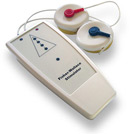In the U.S., millions suffer from psychological disorders including depression, anxiety and insomnia. Doctors typically rely upon pharmaceuticals to treat the underlying symptoms. The negative side effects of these drug regimens have prompted many to look for alternative treatment methodologies.
Electronic therapeutic devices may reduce the number of drug-related errors by reducing the amount of medication needed to treat common psychological disorders.
Brainsway
Israel-based Brainsway Ltd. reported positive results this week in the testing of its non-invasive Transcranial Magnetic Stimulation (TMS) treatment for depression. So far, 64 depressive patients who did not respond to at least two antidepressant drugs have been treated with the Deep TMS device. Brainsway CEO Uzi Sofer believes the data will open the door to a CE Mark.
The company is also gearing up for a multicenter trial in the U.S. Brainsway is waiting to hear back from the FDA but has already contacted several prestigious medical centers including John Hopkins, Harvard and Columbia.
Deep TMS directly affects the brain reward system through the application of brief magnetic pulses. The pulses are administered by passing current through an electromagnetic coil placed adjacent to a patient’s scalp.
The pulses induce an electric field in the underlying brain tissue. When the induced field passes a certain threshold, and is directed in an appropriate orientation relative the brain’s neuronal pathways, localized axonal depolarizations are produced, activating the neurons in the relevant brain structure.
Brainsway Deep TMS System enables direct non-invasive activation of deep brain structures.
Of the 64 depressive patients in the latest trial, 95% responded to the Brainsway method and 45% showed a significant response. 50% of the patients in the trial regressed after three months. The improvement is usually short lasting – repeated treatments may be required.
Fisher-Wallace

Fisher-Wallace Laboratories has developed the Fisher-Wallace Cranial Stimulator, a portable battery powered pulse generator. The company’s non-invasive cranial electrotherapy stimulation (CES) device applies low levels of proprietary micro-current frequencies transcutaneously to the brain. CES has not demonstrated any adverse side effects.
There are several proposed mechanisms of action through which CES is believed to operate—the effects are possibly mediated through a direct action in several brain areas including the limbic system, the hypothalamus or the reticular activating system. Fisher-Wallace has received an FDA 510(K) clearance for the device. It is available in the U.S. by prescription only. CES devices are sold over the counter in Europe and other parts of the world.
The Cranial Stimulator is a portable, battery-powered micro-current pulse generator. It is small enough to hold in one hand, and produces three biologically synchronous waveforms: 15,000 Hz, 15 Hz, and 500 Hz. The two electrical cables transmit current through either a small sponge that is moistened before use or a self-adhesive patch.
A body of research has documented the beneficial effects of such treatment in the alleviation of various physical ailments. In 2004, a study was conducted among aggressive, retarded patients at a maximum security hospital. Patients were given a 3-month course of cranial electrotherapy stimulation. Aggressive episodes declined 59% from baseline; seclusions were down 72%; restraints were down 58%; and use of prescribed-as-needed sedative medications decreased 53%.